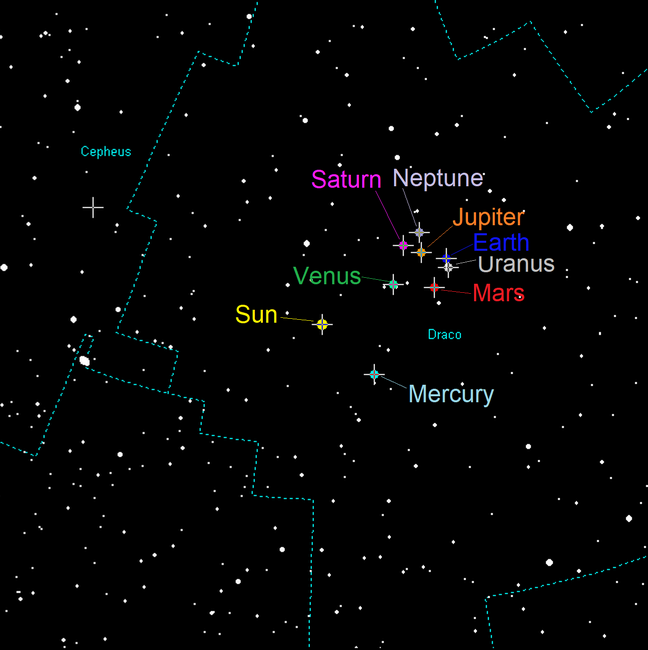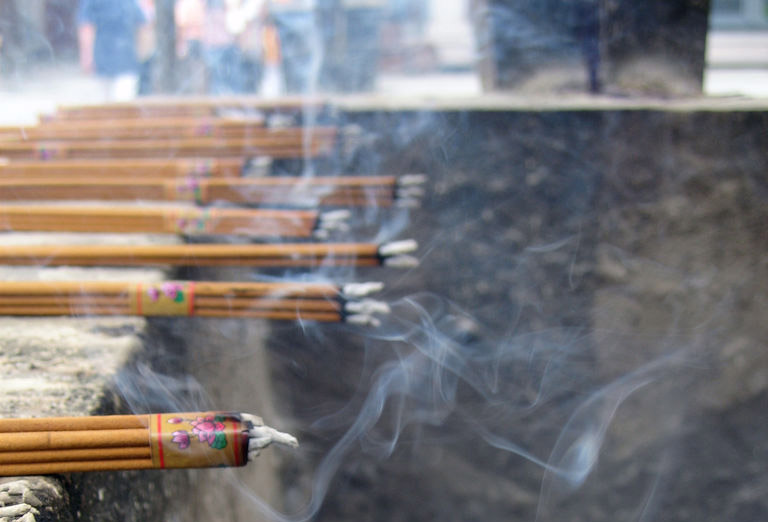|
Heaven Worship
Chinese theology, which comes in different interpretations according to the classic texts and the common religion, and specifically Confucian, Taoist and other philosophical formulations, is fundamentally monistic, that is to say it sees the world and the gods of its phenomena as an organic whole, or cosmos, which continuously emerges from a simple principle. This is expressed by the concept that "all things have one and the same principle" (''wànwù yīlǐ'' ). This principle is commonly referred to as ''Tiān'' , a concept generally translated as "Heaven", referring to the northern culmen and starry vault of the skies and its natural laws which regulate earthly phenomena and generate beings as their progenitors. Ancestors are therefore regarded as the equivalent of Heaven within human society, and therefore as the means connecting back to Heaven which is the "utmost ancestral father" ( ''zēngzǔfù''). Chinese theology may be also called ''Tiānxué'' ("study of Heaven") ... [...More Info...] [...Related Items...] OR: [Wikipedia] [Google] [Baidu] |
Transcendence (religion)
In religion, transcendence is the aspect of a deity's nature and power that is completely independent of the material universe, beyond all known physical laws. This is contrasted with immanence, where a god is said to be fully present in the physical world and thus accessible to creatures in various ways. In religious experience, transcendence is a state of being that has overcome the limitations of physical existence, and by some definitions, has also become independent of it. This is typically manifested in prayer, rituals, meditation, psychedelics and paranormal "visions". It is affirmed in various religious traditions' concept of the divine, which contrasts with the notion of a god (or, the Absolute) that exists exclusively in the physical order (immanentism), or is indistinguishable from it ( pantheism). Transcendence can be attributed to the divine not only in its being, but also in its knowledge. Thus, a god may transcend both the universe and knowledge (is beyon ... [...More Info...] [...Related Items...] OR: [Wikipedia] [Google] [Baidu] |
Hundun
Hundun () is both a "legendary faceless being" in Chinese mythology and the "primordial and central chaos" in Chinese cosmogony, comparable with the world egg. Linguistics ''Hundun'' was semantically extended from a mythic "primordial chaos; nebulous state of the universe before heaven and earth separated" to mean "unintelligible; chaotic; messy; mentally dense; innocent as a child". While ''hùndùn'' "primordial chaos" is usually written as in contemporary vernacular, it is also written as —as in the Daoist classic '' Zhuangzi''—or —as in the '' Zuozhuan''. ''Hùn'' "chaos; muddled; confused" is written either ''hùn'' () or ''hún'' (). These two are interchangeable graphic variants read as ''hún'' ( ) and ''hùn'' "nebulous; stupid" (''hùndùn'' ). ''Dùn'' ("dull; confused") is written as either ''dùn'' () or ''dūn'' (). Isabelle Robinet outlines the etymological origins of ''hundun''. Semantically, the term ''hundun'' is related to several expressions, ... [...More Info...] [...Related Items...] OR: [Wikipedia] [Google] [Baidu] |
Stephan Feuchtwang
Stephan Feuchtwang (born 1937) is emeritus professor of anthropology at the London School of Economics (LSE). His main area of research is China. He was born in Berlin in 1937, the son of Wilhelm Feuchtwang and Eva Neurath. His grandfather, David Feuchtwang David Feuchtwang (27 November 1864 – 6 July 1936) was a Jewish scholar and author, and chief rabbi of Vienna from 1933 until his death in 1936. David Feuchtwang was born in Nikolsburg, Moravia (now Mikulov, Czech Republic) on 27 November 1864, th ..., was the chief rabbi of Vienna. Feuchtwang is the author of books on Chinese popular religion, feng shui, and (with Wang Mingming) a book on local leadership: ''Grassroots Charisma in southern Fujian and northern Taiwan''. References External links Interviewed by Alan Macfarlane 12 March 2009 (video) 1937 births British anthropologists German emigrants to England Jewish emigrants from Nazi Germany to the United Kingdom People from Berlin Living people {{UK-a ... [...More Info...] [...Related Items...] OR: [Wikipedia] [Google] [Baidu] |
玄武 Xuánwǔ, Turtle And Snake
Xuanwu District () is one of 11 districts of Nanjing, the capital of Jiangsu province, China. Xuanwu District is an urban centre located in the north-eastern part of Nanjing. It is the site of the Nanjing Municipal Government. Administrative subdivisions Xuanwu has administrative jurisdiction over the following 7 subdistricts: * Defunct - Houzaimen Subdistrict () merged into Meiyuan Xincun in 2012 Economy The main industries in the district are the leisure and tourism, information technology, retail and services. Its economy is primarily based upon the delivery of services. Industry zones include the Changjiang Road Cultural Area, Xinjiekou Central Economic Area, and Xuzhuang Software Industry Base. The district has attracted multi-national corporations, such as 3M, American Express, Siemens, Hyundai, Samsung, NYK Line, and Cathay Life Insurance. [...More Info...] [...Related Items...] OR: [Wikipedia] [Google] [Baidu] |
Ecliptic North Pole (Běijí 北极) In Tiānlóng 天龙座 (Draco) Between The Dippers
An orbital pole is either point at the ends of an imaginary line segment that runs through the center of an orbit (of a revolving body like a planet, moon or satellite) and is perpendicular to the orbital plane. Projected onto the celestial sphere, orbital poles are similar in concept to celestial poles, but are based on the body's orbit instead of its equator. The north orbital pole of a revolving body is defined by the right-hand rule. If the fingers of the right hand are curved along the direction of orbital motion, with the thumb extended and oriented to be parallel to the orbital axis, then the direction the thumb points is defined to be the orbital north. The poles of Earth's orbit are referred to as the ecliptic poles. For the remaining planets, the orbital pole in ecliptic coordinates is given by the longitude of the ascending node (☊) and inclination (''i''): ''l'' = ☊ - 90°, ''b'' = 90° - ''i''. In the following table, the planetary orbit poles are given i ... [...More Info...] [...Related Items...] OR: [Wikipedia] [Google] [Baidu] |
A & C Black
A & C Black is a British book publishing company, owned since 2002 by Bloomsbury Publishing. The company is noted for publishing '' Who's Who'' since 1849. It also published popular travel guides and novels. History The firm was founded in 1807 by Charles and Adam Black in Edinburgh. In 1851, the company purchased the copyrights to Sir Walter Scott's ''Waverly'' novels for £27,000. The company moved to the Soho district of London in 1889. During the years 1827–1903 the firm published the seventh, eighth and ninth editions of the ''Encyclopædia Britannica''. This was purchased from Archibald Constable after his company's failure to publish the seventh edition of the encyclopedia. Adam Black retired in 1870 due to his disapproval of his sons' extravagant plans for its ninth edition. This edition, however, would sell half a million sets and was released in 24 volumes from 1875 to 1889. Beginning in 1839, the firm published a series of travel guides known as '' Black's Gui ... [...More Info...] [...Related Items...] OR: [Wikipedia] [Google] [Baidu] |
Incense
Incense is aromatic biotic material that releases fragrant smoke when burnt. The term is used for either the material or the aroma. Incense is used for aesthetic reasons, religious worship, aromatherapy, meditation, and ceremony. It may also be used as a simple deodorant or insect repellent. Incense is composed of aromatic plant materials, often combined with essential oils. The forms taken by incense differ with the underlying culture, and have changed with advances in technology and increasing number of uses. Incense can generally be separated into two main types: "indirect-burning" and "direct-burning". Indirect-burning incense (or "non-combustible incense") is not capable of burning on its own, and requires a separate heat source. Direct-burning incense (or "combustible incense") is lit directly by a flame and then fanned or blown out, leaving a glowing ember that smoulders and releases a smoky fragrance. Direct-burning incense is either a paste formed around a bamboo s ... [...More Info...] [...Related Items...] OR: [Wikipedia] [Google] [Baidu] |
Sacrifice
Sacrifice is the offering of material possessions or the lives of animals or humans to a deity as an act of propitiation or worship. Evidence of ritual animal sacrifice has been seen at least since ancient Hebrews and Greeks, and possibly existed before that. Evidence of ritual human sacrifice can also be found back to at least pre-Columbian civilizations of Mesoamerica as well as in European civilizations. Varieties of ritual non-human sacrifices are practiced by numerous religions today. Terminology The Latin term ''sacrificium'' (a sacrifice) derived from Latin ''sacrificus'' (performing priestly functions or sacrifices), which combined the concepts ''sacra'' (sacred things) and ''facere'' (to do or perform). The Latin word ''sacrificium'' came to apply to the Christian eucharist in particular, sometimes named a "bloodless sacrifice" to distinguish it from blood sacrifices. In individual non-Christian ethnic religions, terms translated as "sacrifice" include the Indic '' ... [...More Info...] [...Related Items...] OR: [Wikipedia] [Google] [Baidu] |
Maoism
Maoism, officially called Mao Zedong Thought by the Chinese Communist Party, is a variety of Marxism–Leninism that Mao Zedong developed to realise a socialist revolution in the agricultural, pre-industrial society of the Republic of China and later the People's Republic of China. The philosophical difference between Maoism and traditional Marxism–Leninism is that the peasantry is the revolutionary vanguard in pre-industrial societies rather than the proletariat. This updating and adaptation of Marxism–Leninism to Chinese conditions in which revolutionary praxis is primary and ideological orthodoxy is secondary represents urban Marxism–Leninism adapted to pre-industrial China. Later theoreticians expanded on the idea that Mao had adapted Marxism–Leninism to Chinese conditions, arguing that he had in fact updated it fundamentally, and that Maoism could be applied universally throughout the world. This ideology is often referred to as Marxism–Leninism–Maoism ... [...More Info...] [...Related Items...] OR: [Wikipedia] [Google] [Baidu] |
Great Leap Forward
The Great Leap Forward (Second Five Year Plan) of the People's Republic of China (PRC) was an economic and social campaign led by the Chinese Communist Party (CCP) from 1958 to 1962. CCP Chairman Mao Zedong launched the campaign to reconstruct the country from an agrarian economy into a communist society through the formation of people's communes. Mao decreed that efforts to multiply grain yields and bring industry to the countryside should be increased. Local officials were fearful of Anti-Rightist Campaigns and they competed to fulfill or over-fulfill quotas which were based on Mao's exaggerated claims, collecting non-existent "surpluses" and leaving farmers to starve to death. Higher officials did not dare to report the economic disaster which was being caused by these policies, and national officials, blaming bad weather for the decline in food output, took little or no action. Millions of people died in China during the Great Leap, with estimates ranging from 15 to 55&n ... [...More Info...] [...Related Items...] OR: [Wikipedia] [Google] [Baidu] |






